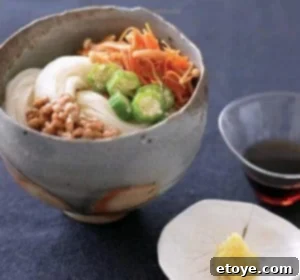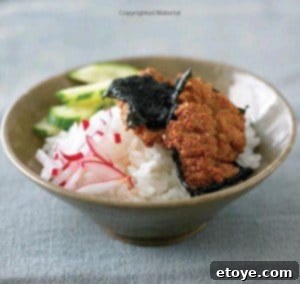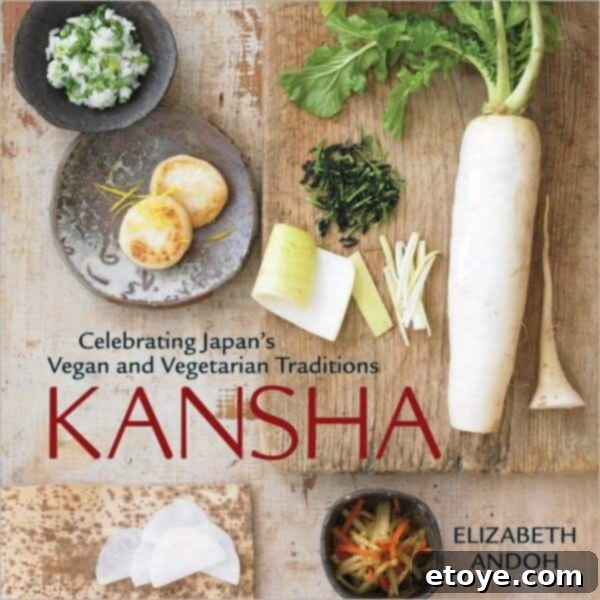Kansha: Embracing Japan’s Vegan and Vegetarian Culinary Wisdom
In an era where mindful eating and sustainable living are more crucial than ever, Elizabeth Andoh’s seminal work, Kansha: Celebrating Japan’s Vegan and Vegetarian Traditions, emerges as a timeless guide. This beautifully crafted cookbook transcends mere recipes, offering readers a profound journey into the heart of Japanese plant-based cuisine, deeply rooted in a philosophy of gratitude and respect for nature. More than just a collection of dishes, Kansha inspires a holistic approach to cooking and life, inviting both seasoned chefs and enthusiastic home cooks to explore a world of flavor, tradition, and sustainability.
Andoh, a revered authority in Japanese culinary arts, distills decades of immersive experience and rigorous training into this essential volume. Her expertise shines through every page, making complex concepts accessible and ancient traditions relevant for the modern kitchen. For anyone seeking to enrich their diet with healthy, flavorful, and ethically conscious meals, Kansha offers an invaluable resource, proving that plant-based cooking can be both exquisite and deeply satisfying.
The Philosophy of Kansha: Gratitude in Every Bite
At the core of this extraordinary book lies the concept of kansha, a Japanese word embodying appreciation and gratitude. This philosophy, deeply ingrained in Buddhist thought and practice, forms the bedrock of traditional Japanese vegan and vegetarian cooking, known as shōjin ryōri. It encourages an profound sense of thankfulness for nature’s abundant gifts – the soil, the water, the sunlight that nourishes our food – and for the dedication and skill of those who transform these raw ingredients into culinary masterpieces.
The spirit of kansha extends beyond mere appreciation; it’s a call to action. It champions cooking practices that are nutritionally sound, aesthetically pleasing, and inherently sustainable. This means minimizing waste, conserving energy, and preserving our precious natural resources. In the Kansha kitchen, every ingredient is valued, every cooking method is purposeful, and every meal is an expression of respect for the earth and its bounty. It’s a powerful reminder that our connection to food is a fundamental part of our connection to the world around us.
 Andoh masterfully demonstrates how this philosophy translates into practical, everyday cooking. One particularly compelling example involves the humble daikon radish. In a true *kansha* kitchen, nothing goes to waste. From its tapered tip to its vibrant green leaves, and even the peels that most cooks would discard, every part of the daikon is ingeniously transformed into an array of distinct, wholesome, and flavorful dishes. This approach not only maximizes nutritional value but also celebrates the ingredient in its entirety, embodying the Japanese principle of *mottainai* – regret concerning waste.
Andoh masterfully demonstrates how this philosophy translates into practical, everyday cooking. One particularly compelling example involves the humble daikon radish. In a true *kansha* kitchen, nothing goes to waste. From its tapered tip to its vibrant green leaves, and even the peels that most cooks would discard, every part of the daikon is ingeniously transformed into an array of distinct, wholesome, and flavorful dishes. This approach not only maximizes nutritional value but also celebrates the ingredient in its entirety, embodying the Japanese principle of *mottainai* – regret concerning waste.
Elizabeth Andoh: A Culinary Bridge Between East and West
Elizabeth Andoh is not just a cookbook author; she is a cultural ambassador. Her unparalleled understanding of Japanese cuisine is the result of decades spent living and studying in Japan, coupled with extensive classical culinary training. This unique background provides her with an authoritative platform from which to teach, making her the ideal guide for exploring these intricate culinary traditions.
Her deep knowledge is brilliantly showcased in “A Guide to the Kansha Kitchen,” a two-part section within the book designed to empower home cooks. The first section delves into fundamental Japanese cooking techniques, explaining precise cutting methods that enhance flavor and presentation, efficient cooking strategies, and essential kitchen equipment. These insights are not merely instructional; they are transformative, helping readers eliminate waste, speed up meal preparation, and elevate their cooking to a professional standard.
The second part of the guide demystifies a range of Japanese ingredients that, while staples in Asian pantries, might be new to Western cooks. Andoh provides clear explanations of these often-intimidating components, detailing their flavors, uses, and how they can significantly broaden any culinary repertoire – whether vegan, vegetarian, or omnivore. This comprehensive approach ensures that readers feel confident and inspired to experiment with new flavors and textures, making traditional Japanese plant-based cooking accessible to everyone.
A Culinary Tapestry: Exploring the Recipes
Kansha boasts over 100 meticulously developed vegan recipes, each a testament to the versatility and deliciousness of Japanese plant-based cuisine. Andoh meticulously curates a collection that spans centuries of culinary evolution, from ancient temple fare to contemporary innovations:
- Shōjin Ryōri: Buddhist Temple Cuisine: Delve into the serene and artful world of Buddhist temple cooking. These dishes, traditionally prepared by monks, emphasize balance, simplicity, and the inherent flavors of seasonal vegetables. Examples like the velvety “Creamy Sesame Pudding” (goma dofu) showcase elegant textures and profound flavors, while the ingenious “Glazed Eel Look-Alike” demonstrates creative plant-based mimicry without compromising on taste or principle.
- Macrobiotic Essentials: Discover recipes rooted in macrobiotic principles, focusing on whole grains, vegetables, and sea vegetables for holistic well-being. Dishes such as “Toasted Hand-Pressed Brown Rice with Hijiki” offer nourishing staples, and “Robust Miso” explores the depth of flavor derived from fermented foods.
- Historical Japanese Fare: Explore dishes with rich historical significance, reflecting the enduring culinary traditions of Japan. The “Skillet-Scrambled Tofu with Leafy Greens” provides a hearty and adaptable meal, while various “Pungent Pickles” (tsukemono) introduce the art of preservation and add vibrant accents to any meal.
- Inventive Modern Creations: Andoh also embraces contemporary culinary trends, presenting imaginative new dishes that push the boundaries of plant-based cooking. Her “Eggplant Sushi” offers a fresh, vegetable-centric take on a classic, and “Tōfu-Tōfu Burgers” provide a delicious and satisfying plant-based alternative to traditional patties, perfect for a modern palate.
Each recipe is not just a set of instructions but an invitation to engage with the ingredients and methods in a thoughtful, appreciative way, reflecting the core philosophy of *kansha*.
Stunning Visuals by Leigh Beisch
Complementing Andoh’s masterful instructions are the breathtaking images captured by award-winning photographer Leigh Beisch. Beisch’s artistry transforms each dish into a visual feast, perfectly conveying the beauty, elegance, and vibrant colors inherent in Japanese cuisine. The stunning photography not only makes the recipes more appealing but also serves as a source of inspiration, illustrating the aesthetic principles that are so vital to Japanese culinary traditions. The visual narrative woven throughout the book elevates Kansha from a mere cookbook to a truly immersive experience.
Acclaim and Endorsements: What Critics and Chefs Are Saying

Upon its release, Kansha garnered widespread praise from culinary experts, food historians, and lifestyle critics alike, solidifying its status as a must-have for any serious cook. The reviews consistently highlight the book’s depth, authenticity, and broad appeal:
- Broad Accessibility and Appeal: DailyCandy hailed Kansha as a starting point for “sanctimonious foodies,” noting that its “authentically Japanese and tasty enough for carnivores” recipes, like creamy leek soup and brown sugar ice, transcend dietary preferences. The Library Journal, in a STARRED REVIEW, emphasized its value “not only by vegetarians, vegans, and Japanese food enthusiasts but by any adventurous cook looking for a distinctive perspective on fresh, healthy food,” highly recommending it for those interested in “green living.”
- In-Depth Knowledge and Authenticity: Fuchsia Dunlop, author and expert on Chinese cuisine, lauded Kansha as “a beautiful collection of gentle, thrifty recipes” and “a fascinating introduction to Japanese vegetarian cooking,” praising Elizabeth Andoh’s “authority and an infectious love of Japan and its culinary traditions.” Michael Romano, a renowned chef and culinary development president, welcomed Kansha with “deep appreciation and utmost joy,” calling it “so much more than just a recipe compendium.” He described it as “an exquisite, thoroughly detailed, careful, and caring guide to the people, culture, and cuisine of Japan,” feeling “lovingly guided and nurtured, expertly instructed, and, finally, deliciously nourished.”
- Practicality and Inspiration: Deborah Madison, author of bestselling vegetarian cookbooks, found the book “fresh and deeply informative,” with “beguiling recipes.” She particularly appreciated how Andoh “make[s] sense out of Japanese ingredients I’ve long found mystifying,” and lauded “the sensibility of Kansha, an approach to life and to food that feels so right.” Merry White, a professor of food anthropology, shared her excitement, stating, “I haven’t been so excited about a new cookbook in years. Andoh’s book, Kansha, has stirred me so—I cannot wait to get cooking.” She noted that for “Japan hands” who miss specific delicacies, it feels “as though the teacher we’ve wanted is by our side.”
- Philosophical and Technical Brilliance: Food historian Rachel Laudan commended Andoh’s ability to be “at once lyrical and meticulous, taking the reader effortlessly from the profundities of Japanese culinary philosophy to practical and novel culinary techniques.” Laudan affirmed that Kansha is “not just for vegans and vegetarians” but “a veritable treasure trove for transforming even the humblest of vegetables into delicacies, and for exploring the full potential of rice, noodles, and tofu.”

These powerful endorsements underscore the book’s dual power: as a source of delicious, authentic recipes and as a profound guide to a more thoughtful and sustainable way of eating.
Conclusion: A Timeless Work for Mindful Kitchens
Kansha: Celebrating Japan’s Vegan and Vegetarian Traditions by Elizabeth Andoh is far more than a cookbook; it is an invitation to embrace a philosophy that enriches not only our plates but also our lives. Through its eloquent descriptions, meticulously crafted recipes, and insightful guidance, Andoh provides a comprehensive introduction to the art of Japanese plant-based cooking. It is a pioneering volume that inspires appreciation for nature’s bounty, encourages mindful consumption, and fosters a deeper connection to our food.
Whether you are a devoted vegan, an adventurous vegetarian, or simply a curious cook seeking to expand your culinary horizons and embrace more sustainable practices, Kansha offers a treasure trove of wisdom and delicious possibilities. It stands as a testament to the fact that healthy, ethical eating can be profoundly satisfying, endlessly creative, and deeply rooted in tradition.
***
Reprinted with permission from Kansha: Celebrating Japan’s Vegan and Vegetarian Traditions by Elizabeth Andoh, copyright © 2010. Published by Ten Speed Press, a division of Random House, Inc.
Photo credit: Leigh Beisch© 2010 Purchase book at Amazon: Kansha: Celebrating Japan’s Vegan and Vegetarian Traditions by Elizabeth Andoh
